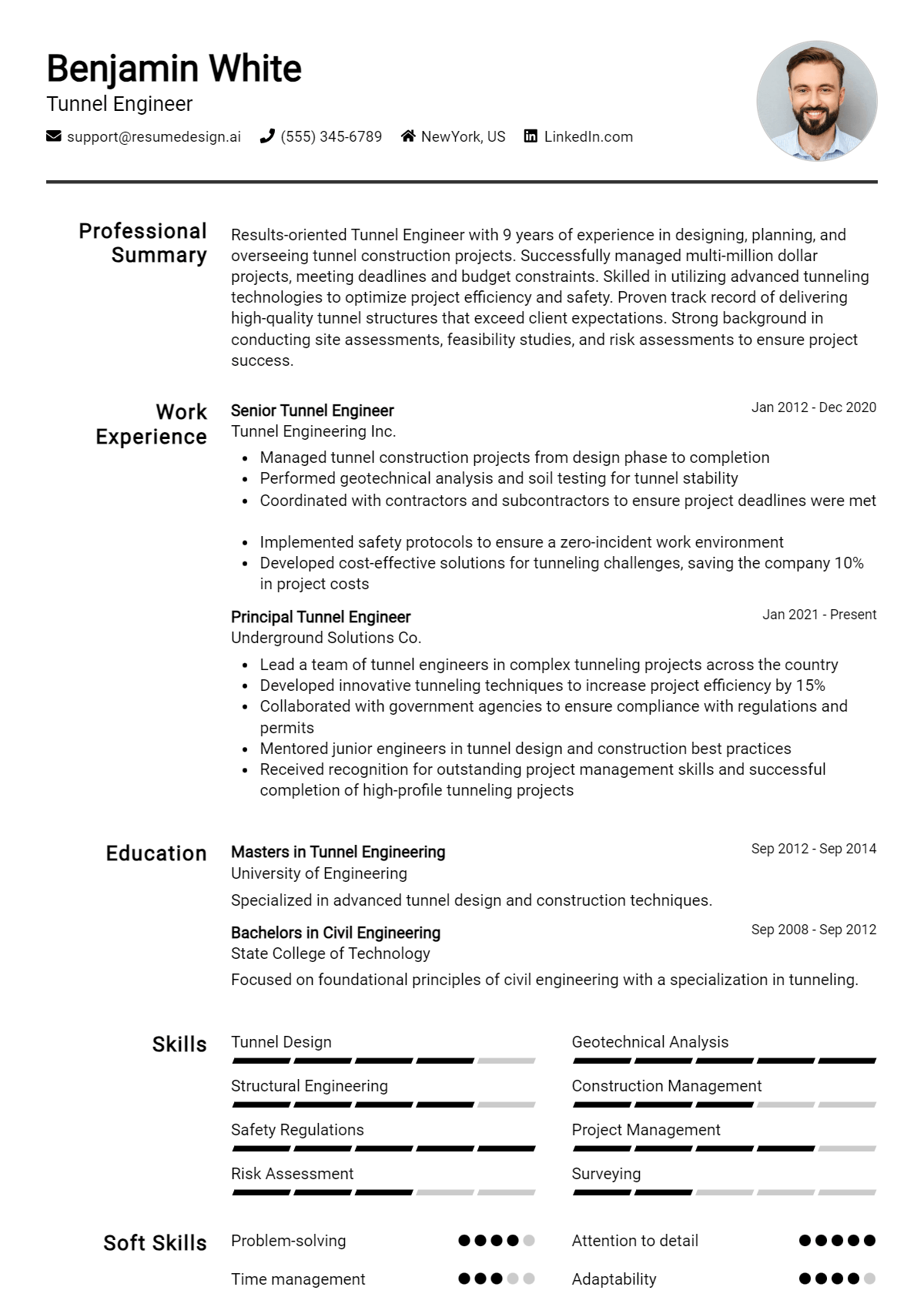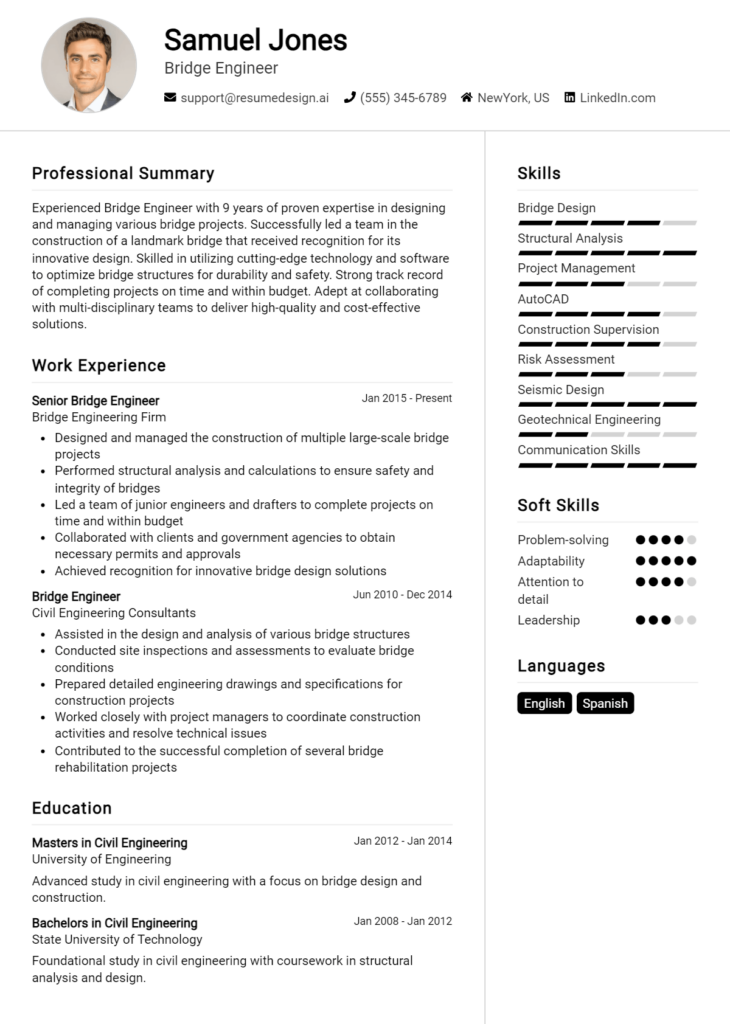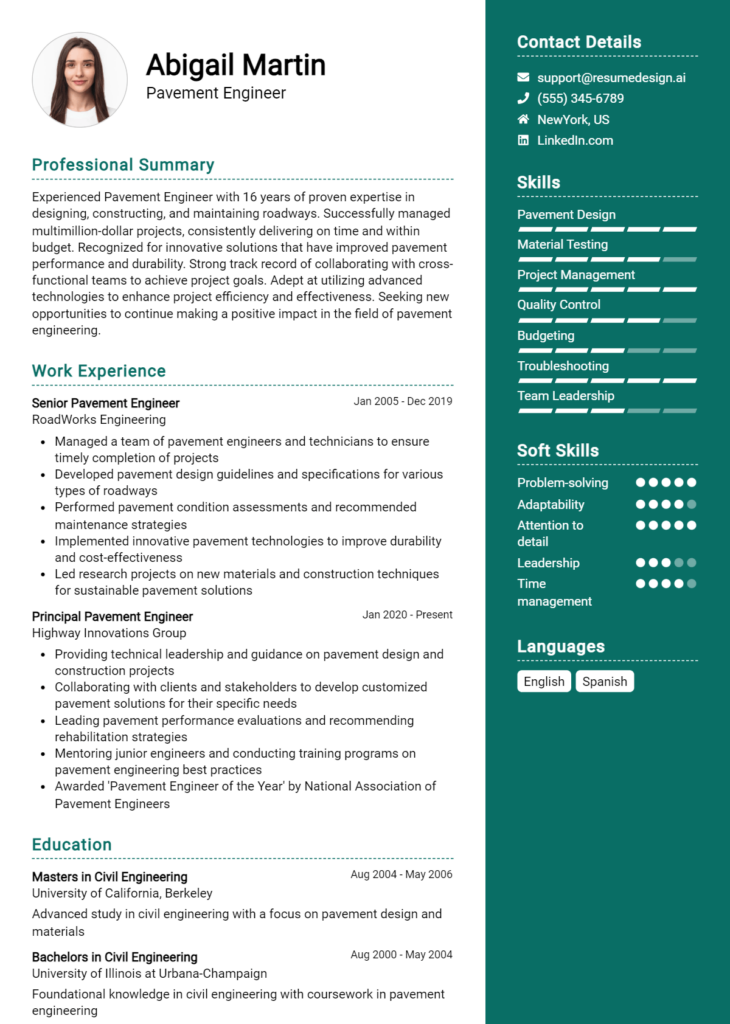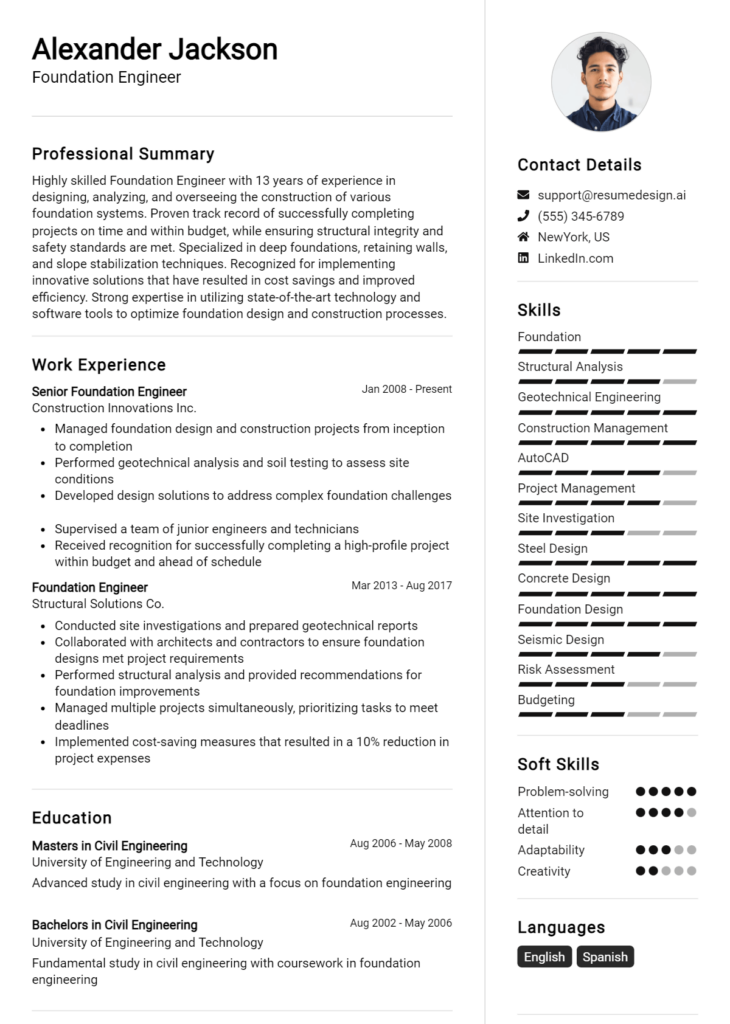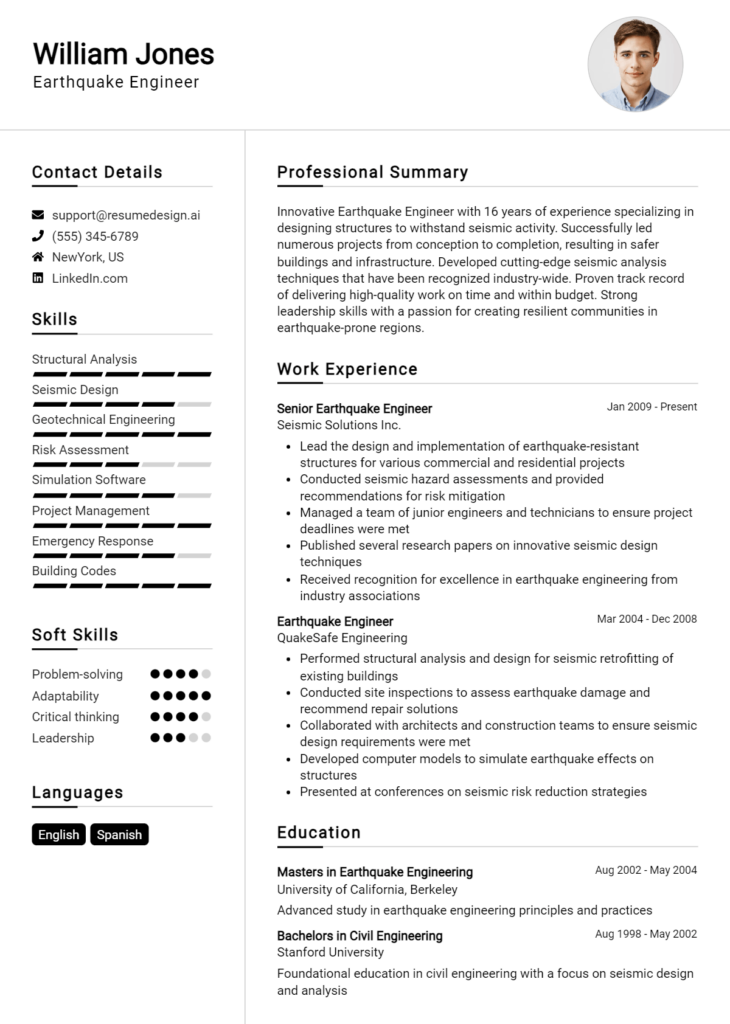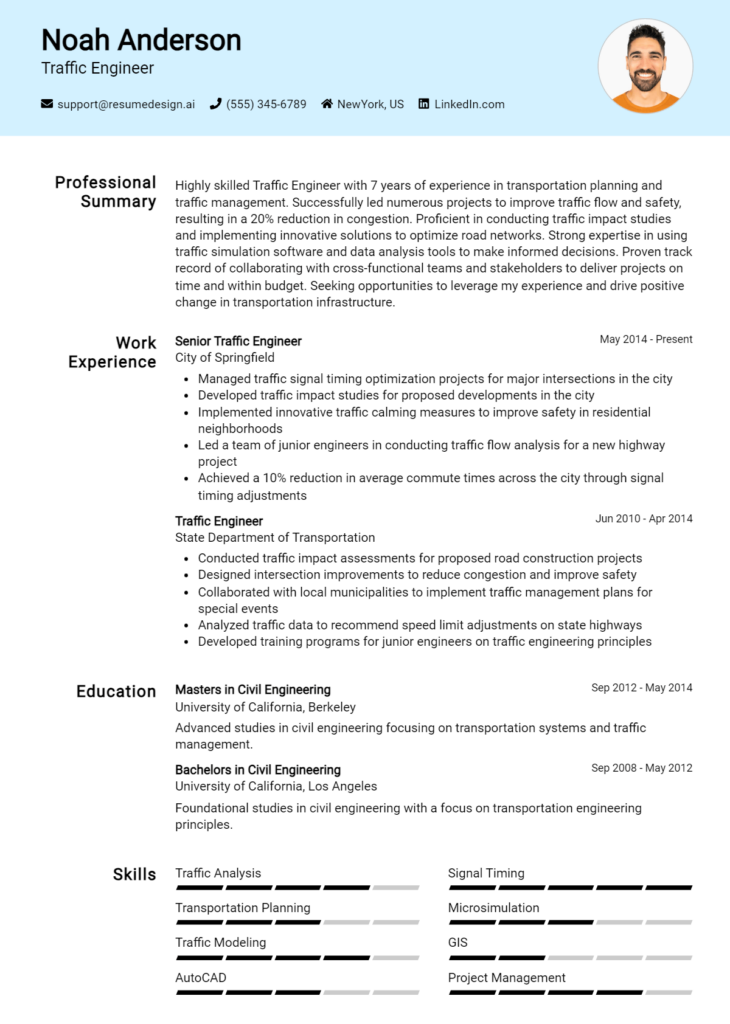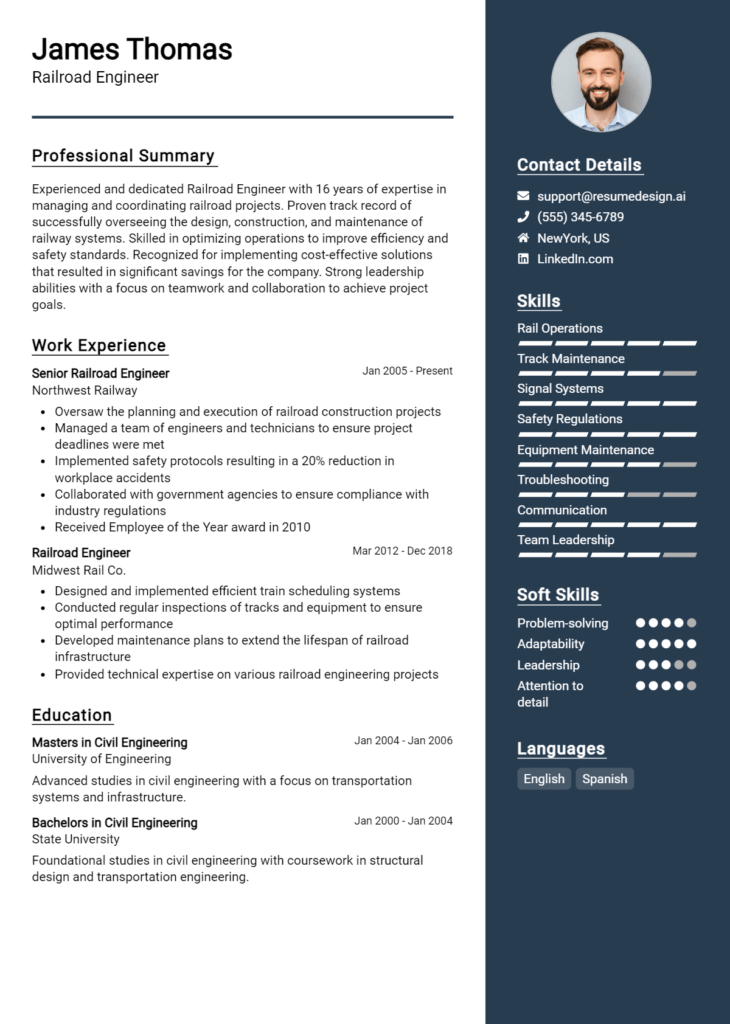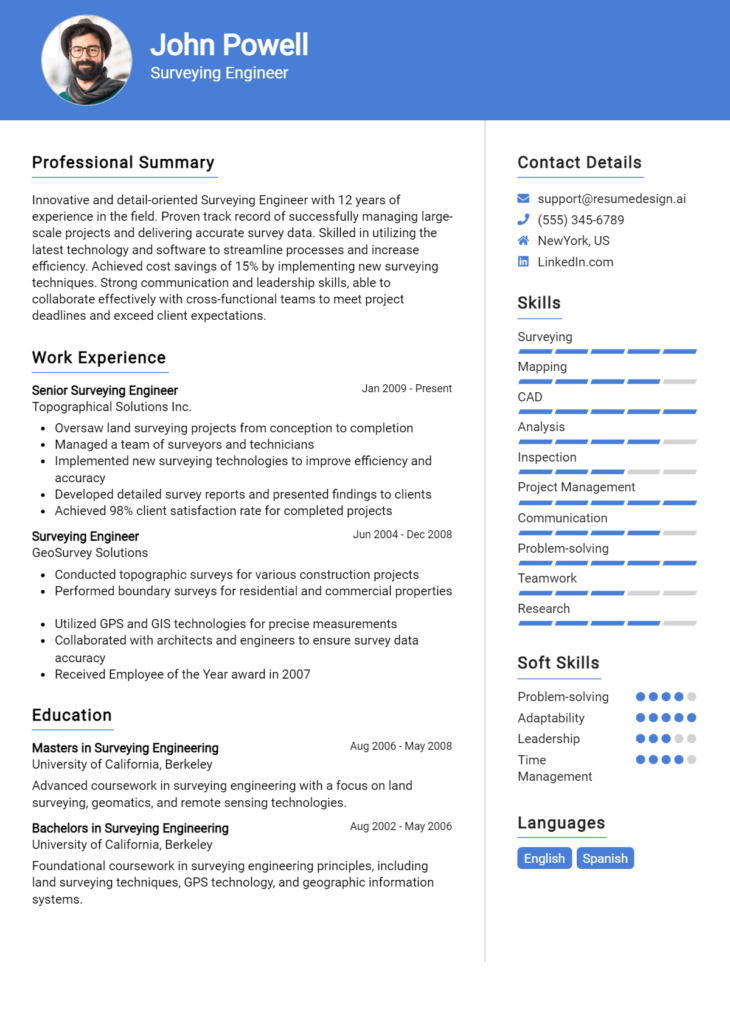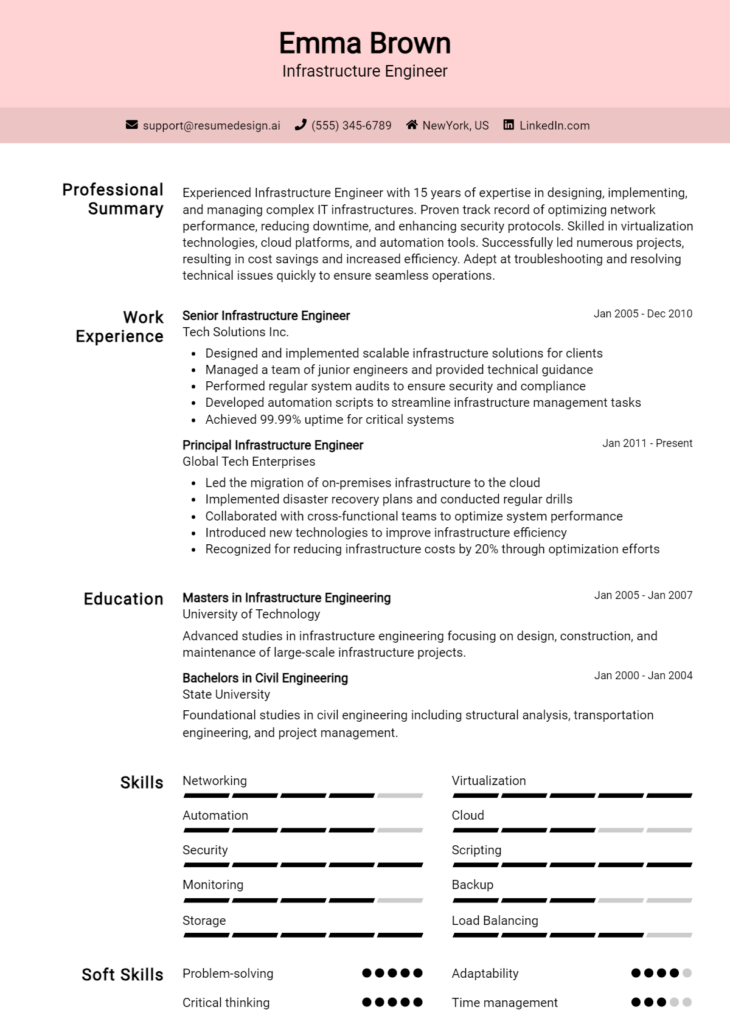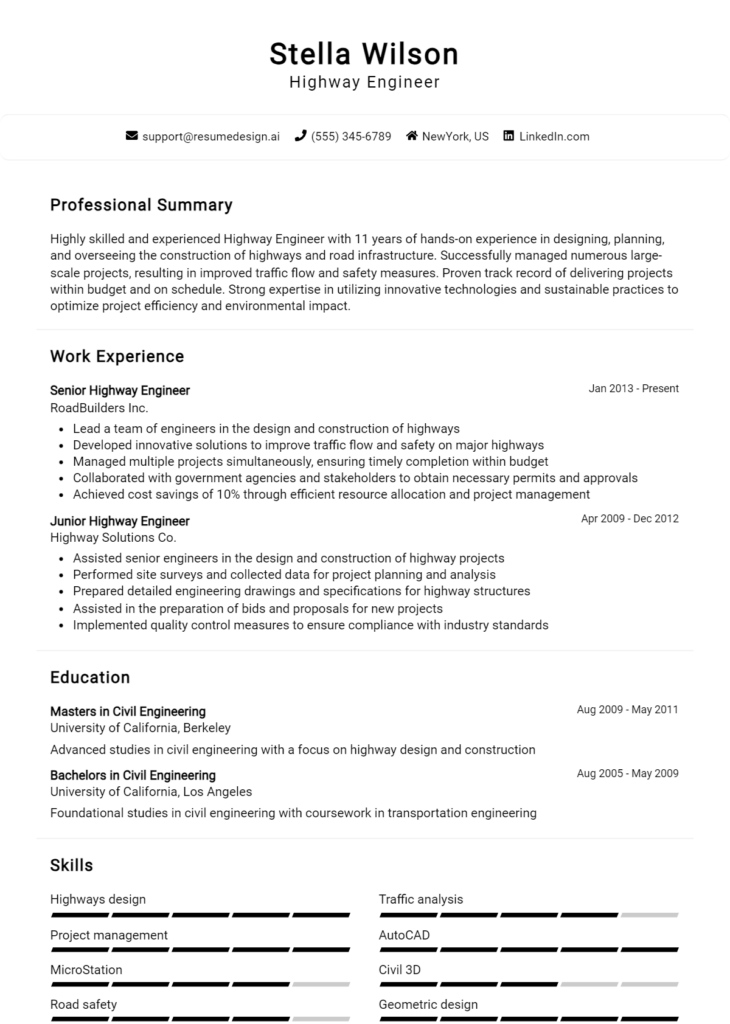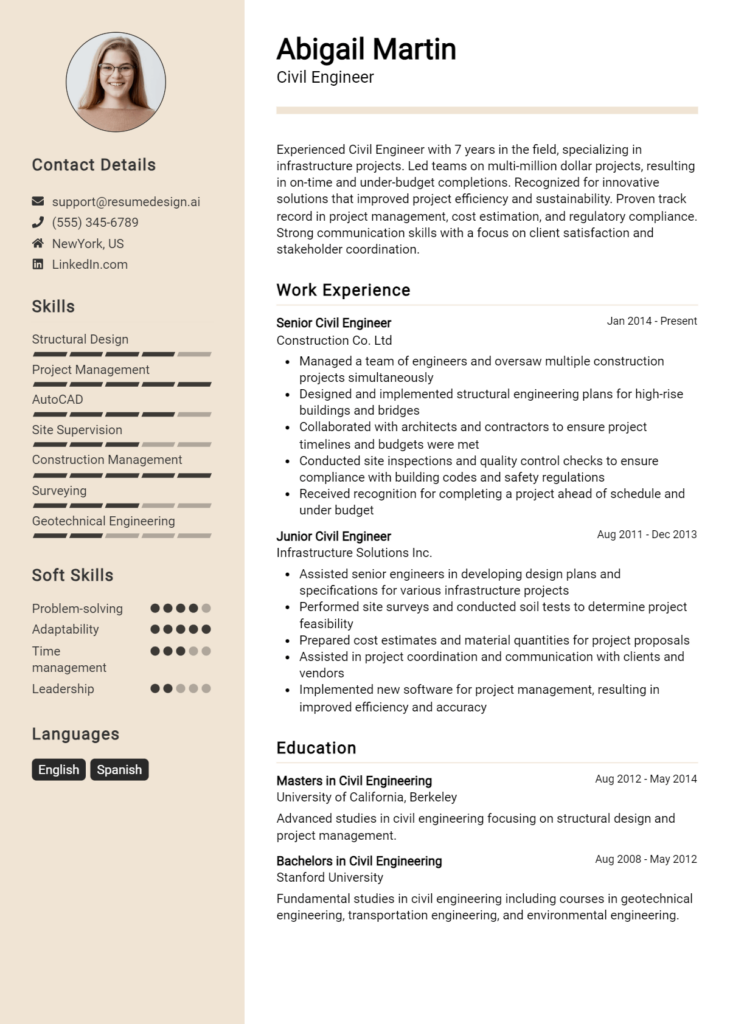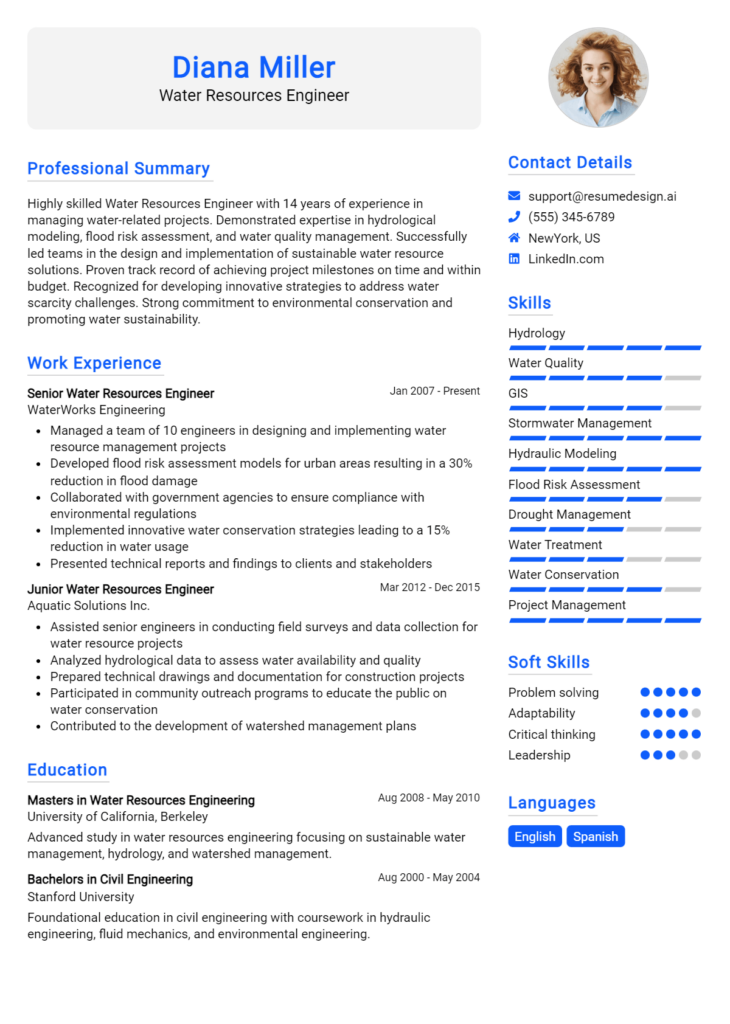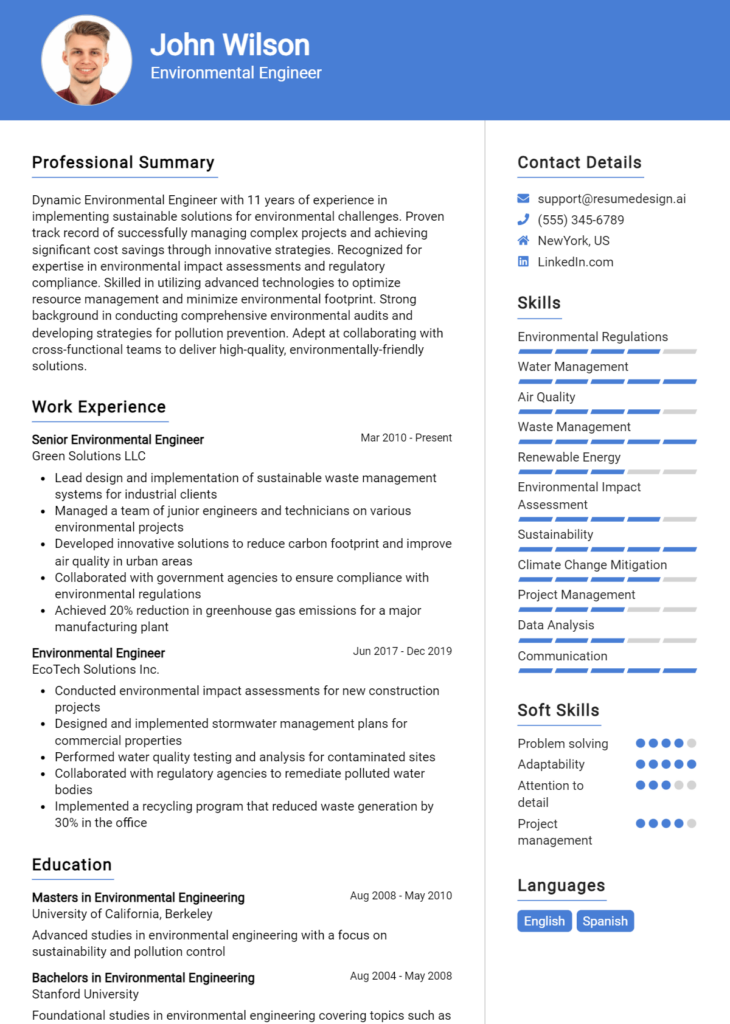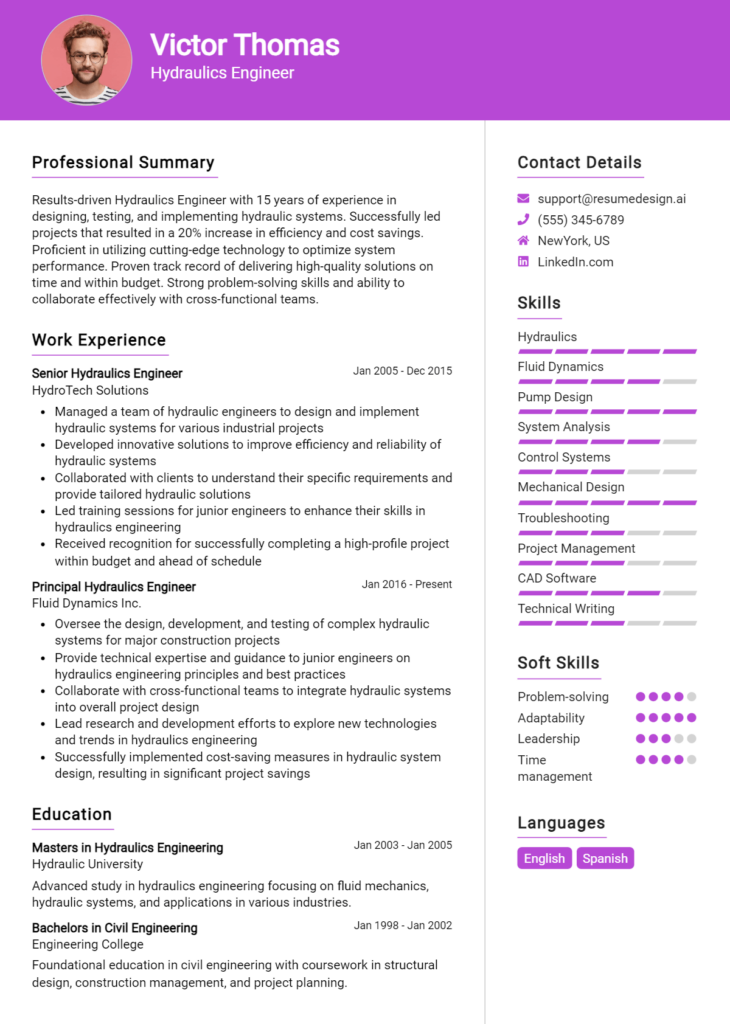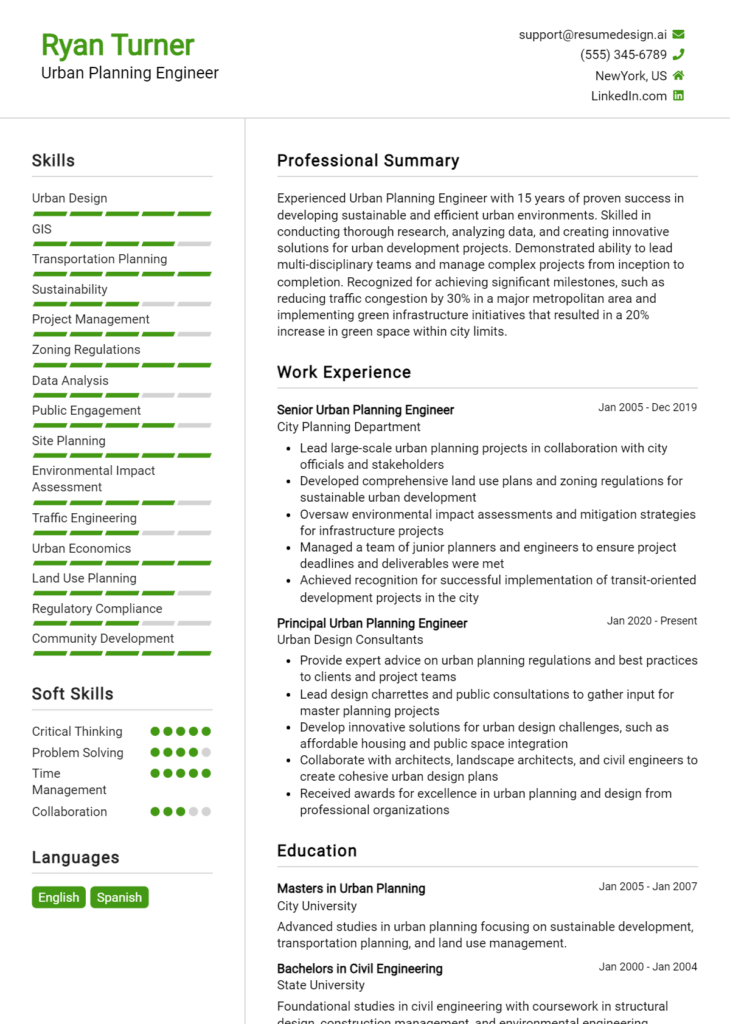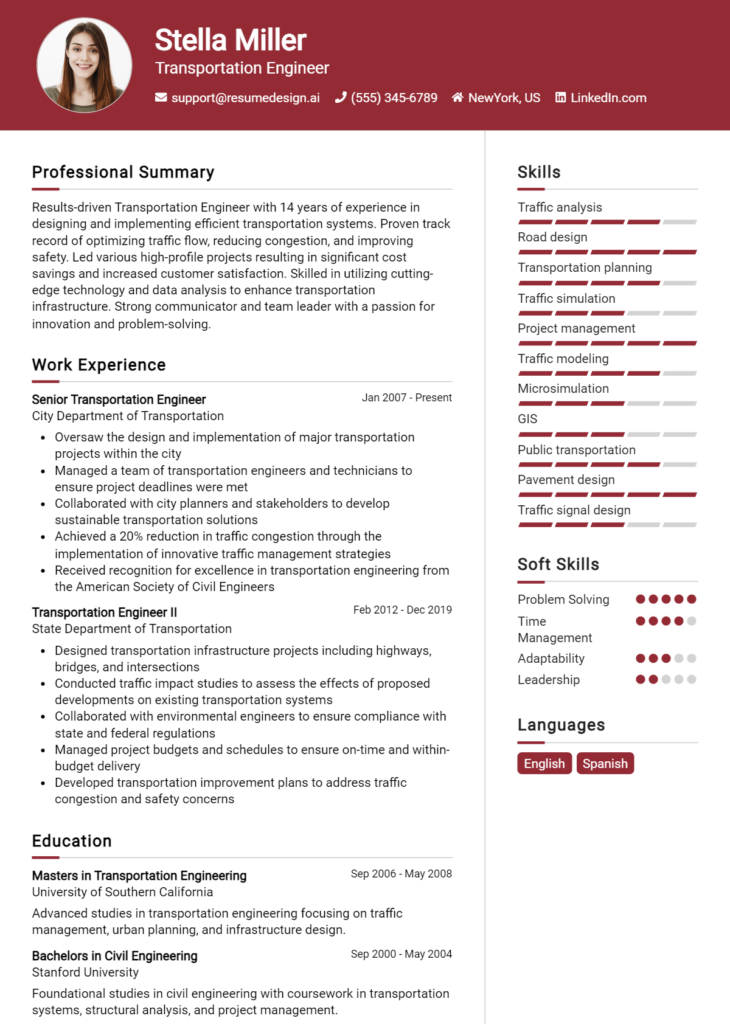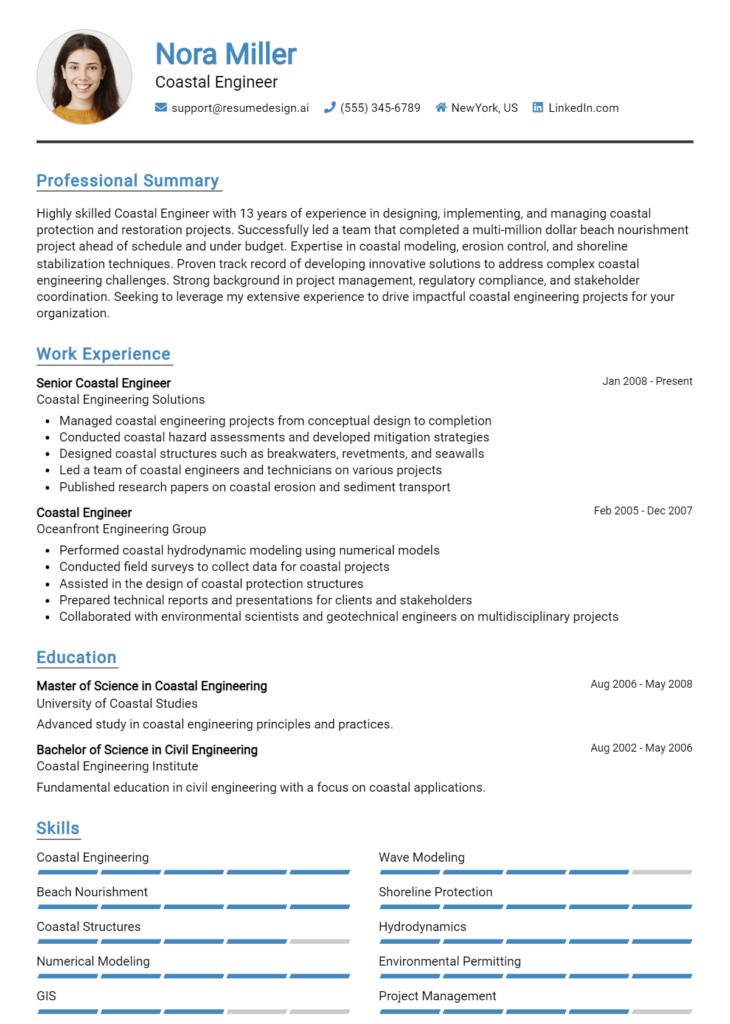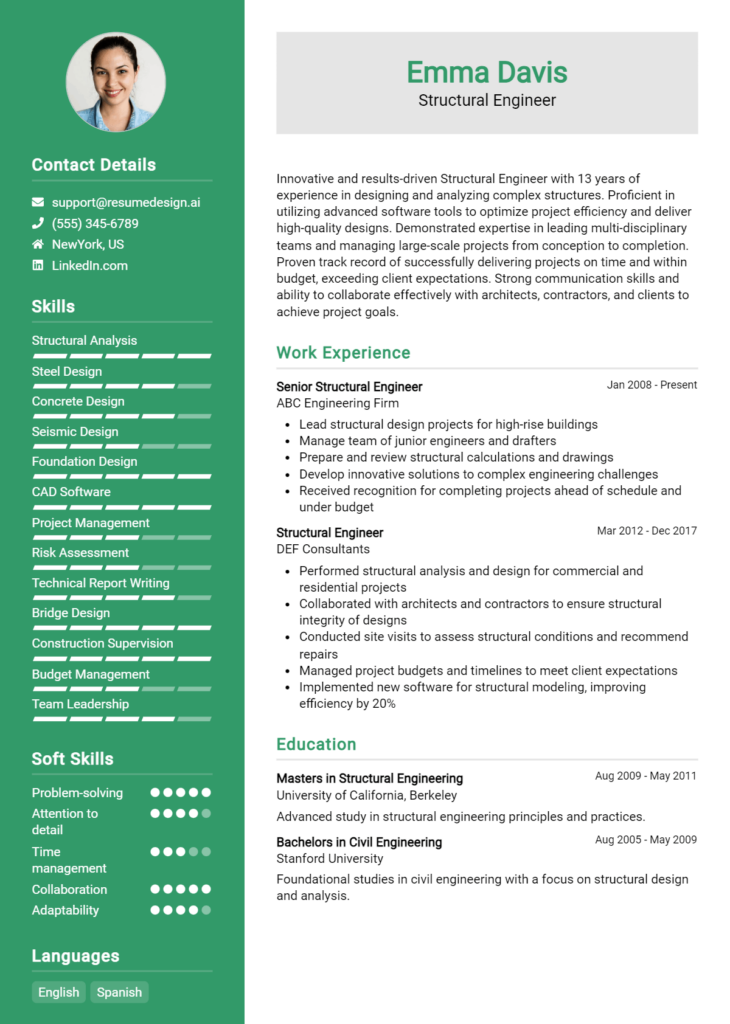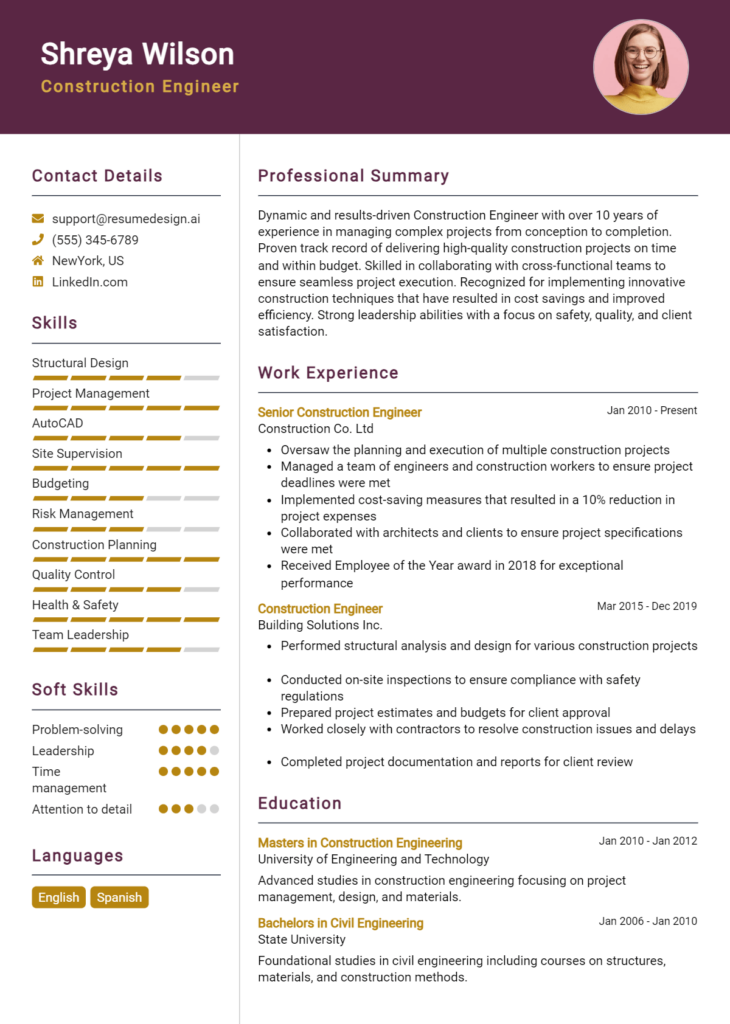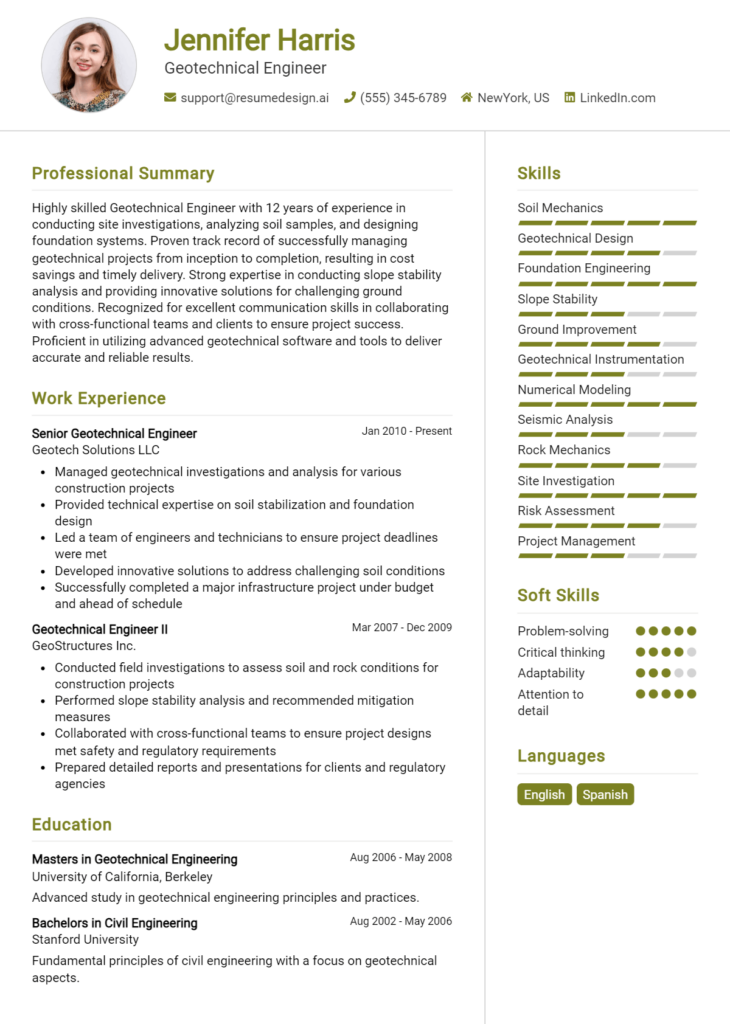Tunnel Engineer Core Responsibilities
A Tunnel Engineer plays a pivotal role in the planning, design, and construction of underground structures, ensuring safety and efficiency while collaborating across various departments. Key responsibilities include conducting geological surveys, developing engineering plans, and overseeing construction activities. Essential skills encompass technical expertise in tunneling methods, operational management, and strong problem-solving capabilities. These skills are vital for achieving project goals and maintaining safety standards. A well-structured resume highlighting these qualifications can effectively demonstrate a candidate's readiness to contribute to the organization's success.
Common Responsibilities Listed on Tunnel Engineer Resume
- Conduct geological and geotechnical site investigations.
- Design tunnel layouts and structural systems.
- Analyze project feasibility and budget constraints.
- Develop and implement construction plans and schedules.
- Monitor and ensure compliance with safety regulations.
- Coordinate with architects, contractors, and government agencies.
- Manage and supervise tunneling operations on-site.
- Perform risk assessments and prepare mitigation strategies.
- Utilize software for modeling and simulations.
- Prepare technical reports and documentation.
- Provide support during inspections and quality control processes.
- Stay updated on industry trends and technological advancements.
High-Level Resume Tips for Tunnel Engineer Professionals
In the competitive field of tunnel engineering, a well-crafted resume serves as a critical first impression for potential employers. It is not just a document listing your work history; it is a powerful marketing tool that showcases your skills, achievements, and suitability for the role. A polished resume can set you apart from other candidates, demonstrating your expertise in tunnel design, construction, and safety management. This guide aims to provide practical and actionable resume tips specifically tailored for Tunnel Engineer professionals, helping you to effectively communicate your qualifications and land that coveted position.
Top Resume Tips for Tunnel Engineer Professionals
- Customize your resume for each job application by closely matching your skills and experiences to the job description.
- Highlight your relevant experience in tunnel projects, specifying your role and contributions to each project.
- Quantify your achievements with metrics, such as the length of tunnels constructed or cost savings achieved through innovative engineering solutions.
- Showcase industry-specific skills such as geotechnical analysis, project management, and knowledge of tunneling equipment.
- Include certifications and licenses that are relevant to tunnel engineering, such as PMP or specific tunneling safety certifications.
- Utilize action verbs in your descriptions to convey your impact effectively, such as "led," "developed," or "optimized."
- Incorporate keywords from the job description to ensure your resume passes through Applicant Tracking Systems (ATS).
- Keep your resume concise and focused, ideally within one to two pages, ensuring every word adds value.
- Consider adding a summary statement at the top of your resume that encapsulates your experience and career goals.
By implementing these tips, Tunnel Engineer professionals can significantly enhance their resumes, making them more compelling and relevant. A targeted and well-structured resume not only increases your chances of catching the attention of hiring managers but also showcases your dedication and expertise in the field, ultimately improving your chances of landing that desired job in tunnel engineering.
Why Resume Headlines & Titles are Important for Tunnel Engineer
In the competitive field of tunnel engineering, a well-crafted resume headline or title plays a crucial role in capturing the attention of hiring managers. A strong headline serves as a concise summary of a candidate's key qualifications, skills, and experiences, allowing them to stand out from a pool of applicants. It should be relevant and directly related to the job being applied for, ensuring that the candidate's expertise is immediately evident. By encapsulating essential information in one impactful phrase, a compelling resume headline can significantly enhance a candidate's chances of making a positive first impression.
Best Practices for Crafting Resume Headlines for Tunnel Engineer
- Keep it concise; aim for one impactful phrase.
- Use industry-specific keywords relevant to tunnel engineering.
- Highlight your most significant qualifications or achievements.
- Make it role-specific, tailoring it to the job description.
- Avoid jargon that may not be universally understood.
- Focus on the value you bring to potential employers.
- Consider including years of relevant experience.
- Stay away from generic phrases and clichés.
Example Resume Headlines for Tunnel Engineer
Strong Resume Headlines
Experienced Tunnel Engineer Specializing in Advanced Underground Construction Techniques
Results-Driven Tunnel Engineer with 10+ Years in Complex Infrastructure Projects
Tunnel Engineering Professional with Expertise in Geotechnical Analysis and Risk Management
Innovative Tunnel Engineer Committed to Sustainable and Efficient Project Solutions
Weak Resume Headlines
Tunnel Engineer Seeking Opportunities
Hardworking Engineer with Experience
Engineering Professional
The strong headlines are effective because they clearly convey the candidate's specific strengths, relevant experience, and unique contributions to the field of tunnel engineering. Each headline is tailored to highlight key qualifications that align with the job requirements, making them memorable and impactful. In contrast, the weak headlines fail to impress due to their vagueness and lack of detail, which do not provide hiring managers with enough information about the candidate's capabilities or specialization. This stark contrast emphasizes the importance of a well-thought-out resume headline in the job application process.
Writing an Exceptional Tunnel Engineer Resume Summary
A well-crafted resume summary is crucial for Tunnel Engineers seeking to stand out in a competitive job market. This brief yet powerful introduction serves as the first impression for hiring managers, allowing them to quickly gauge a candidate's suitability for the role. A strong summary encapsulates key skills, relevant experience, and notable accomplishments that align with the specific demands of tunnel engineering. By being concise and impactful, the resume summary can effectively capture attention and encourage further review of the candidate's qualifications.
Best Practices for Writing a Tunnel Engineer Resume Summary
- Quantify achievements: Use numbers to highlight your contributions and impact in previous roles.
- Focus on relevant skills: Emphasize technical and soft skills that are directly applicable to tunnel engineering.
- Tailor the summary: Customize your summary for each job application to align with the specific job description.
- Be concise: Keep your summary to 2-4 sentences to maintain clarity and impact.
- Use action verbs: Start sentences with strong action verbs to convey your accomplishments dynamically.
- Mention certifications: Include relevant certifications or licenses to establish credibility in the field.
- Highlight teamwork and leadership: Showcase your ability to work collaboratively and lead projects effectively.
- Showcase problem-solving skills: Emphasize your capacity to address and solve engineering challenges efficiently.
Example Tunnel Engineer Resume Summaries
Strong Resume Summaries
Results-driven Tunnel Engineer with over 8 years of experience in large-scale underground construction projects, successfully managing budgets exceeding $5 million and reducing project timelines by 15% through efficient resource allocation.
Detail-oriented Tunnel Engineer skilled in using advanced modeling software to design safe and cost-effective tunneling solutions. Achieved a 20% reduction in material costs on past projects while maintaining strict safety standards.
Proficient in geotechnical analysis and risk assessment, with a proven track record of leading teams in the construction of three major urban subway tunnels, improving project delivery times by 30% through innovative engineering solutions.
Weak Resume Summaries
Tunnel Engineer with experience in construction. Looking for a job where I can use my skills.
Dedicated professional with a background in tunnel engineering. I am eager to learn and contribute to a team.
The strong resume summaries are considered effective because they include specific achievements, quantify results, and demonstrate relevant skills that align with the role of a Tunnel Engineer. In contrast, the weak summaries lack detail, do not highlight measurable outcomes, and fail to convey what makes the candidate a compelling choice for the position, rendering them too generic and ineffective.
Work Experience Section for Tunnel Engineer Resume
The work experience section of a Tunnel Engineer resume is pivotal in demonstrating a candidate's technical expertise and practical application of engineering principles. This section serves to highlight not just the candidate's ability to handle complex tunnel construction projects, but also their proficiency in managing teams, coordinating with multidisciplinary professionals, and ensuring the delivery of high-quality outputs within deadlines. By quantifying achievements—such as project costs saved, timelines met, and safety records maintained—candidates can align their experience with industry standards, effectively showcasing their value to potential employers.
Best Practices for Tunnel Engineer Work Experience
- Highlight specific technical skills relevant to tunnel engineering, such as geotechnical analysis, tunneling methods, and software proficiency.
- Quantify results wherever possible, using metrics like percentage improvements, cost savings, or project timelines.
- Showcase leadership roles, detailing how you managed teams or projects to achieve successful outcomes.
- Include collaborative efforts with other engineering disciplines, emphasizing communication and teamwork.
- Tailor your experiences to align with the job description, focusing on skills and projects that match the employer's needs.
- Utilize action verbs to convey a sense of initiative and impact in your contributions.
- Document any certifications or training that further demonstrate your qualifications in tunneling practices.
- Keep descriptions concise but informative, ensuring clarity and engagement for the reader.
Example Work Experiences for Tunnel Engineer
Strong Experiences
- Led a team of 10 engineers on a $5 million tunnel project, completing it 3 months ahead of schedule and under budget by 15% through efficient resource management.
- Implemented innovative geotechnical monitoring techniques that reduced structural failure rates by 30%, enhancing safety and reliability.
- Collaborated with environmental specialists to ensure compliance with regulations, resulting in zero environmental violations during the project lifecycle.
- Designed and executed risk assessment protocols that identified potential hazards, improving team response plans and reducing incident rates by 25%.
Weak Experiences
- Worked on various tunnel projects and participated in team meetings.
- Assisted in some engineering tasks and followed instructions from supervisors.
- Helped with project documentation and made minor contributions to the team's efforts.
- Involved in tunnel construction activities without specifying roles or outcomes.
The examples listed as strong experiences are considered effective because they demonstrate clear, quantifiable achievements and specific contributions to projects, showcasing both technical and leadership capabilities. In contrast, the weak experiences lack detail and measurable outcomes, failing to convey the candidate's impact or specific skills, resulting in a less compelling narrative for potential employers.
Education and Certifications Section for Tunnel Engineer Resume
The education and certifications section of a Tunnel Engineer resume is crucial in demonstrating the candidate's academic achievements and professional qualifications. This section not only showcases the educational background relevant to the field of engineering but also emphasizes the importance of industry-recognized certifications and ongoing professional development. By including specific coursework, relevant certifications, and specialized training, candidates can significantly enhance their credibility and illustrate their commitment to staying updated with the latest industry standards and practices. Such details contribute to aligning the candidate's qualifications with the requirements of the job role, making them a more attractive option for potential employers.
Best Practices for Tunnel Engineer Education and Certifications
- Include only relevant degrees and certifications that directly pertain to tunnel engineering.
- List the most advanced degrees first, such as a Master’s or PhD, followed by bachelor’s degrees.
- Highlight certifications from recognized professional organizations, such as the American Society of Civil Engineers (ASCE) or the International Tunneling and Underground Space Association (ITA).
- Provide details about relevant coursework that applies to tunneling and geotechnical engineering.
- Incorporate any specialized training or workshops attended that are pertinent to tunneling technologies.
- Use clear formatting to differentiate between degrees, certifications, and training for better readability.
- Include dates of completion to demonstrate ongoing professional development.
- Tailor the education and certifications section to reflect the requirements of the specific job application.
Example Education and Certifications for Tunnel Engineer
Strong Examples
- M.S. in Civil Engineering, Geotechnical Focus, University of California, Berkeley, 2021
- Certified Tunnel Engineer (CTE) from the International Tunneling and Underground Space Association, 2022
- B.S. in Geological Engineering, Colorado School of Mines, 2019
- Advanced Tunneling Techniques Workshop, National Academy of Sciences, 2023
Weak Examples
- B.A. in History, University of Texas, 2010
- Basic First Aid Certification, Red Cross, 2018
- Online Course in Project Management, 2020
- High School Diploma, Springfield High School, 2008
The strong examples listed above are considered relevant and beneficial for a Tunnel Engineer resume because they directly pertain to the field of engineering and tunneling, showcasing advanced education and specialized certifications. In contrast, the weak examples lack relevance to the role of a Tunnel Engineer, as they include degrees and certifications that do not contribute to the candidate's qualifications for this specific engineering discipline. Highlighting pertinent educational achievements and certifications not only strengthens the candidate's profile but also aligns their qualifications with industry expectations.
Top Skills & Keywords for Tunnel Engineer Resume
As a Tunnel Engineer, showcasing the right skills on your resume is crucial for standing out in a competitive job market. Employers look for candidates who not only possess technical expertise but also demonstrate strong interpersonal and problem-solving abilities. Including a well-rounded mix of hard and soft skills can effectively highlight your qualifications, making your resume more appealing to potential employers. By emphasizing these skills, you can illustrate your capability to manage complex projects and collaborate effectively with multidisciplinary teams in the challenging field of tunnel engineering.
Top Hard & Soft Skills for Tunnel Engineer
Soft Skills
- Strong communication skills
- Team collaboration
- Problem-solving ability
- Adaptability and flexibility
- Attention to detail
- Time management
- Critical thinking
- Leadership qualities
- Conflict resolution
- Creativity in design and planning
Hard Skills
- Proficiency in geotechnical analysis
- Knowledge of tunneling methods (e.g., TBM, NATM)
- Familiarity with CAD software (e.g., AutoCAD, MicroStation)
- Expertise in structural engineering principles
- Understanding of safety regulations and compliance
- Experience with project management software
- Ability to conduct risk assessments
- Proficiency in data analysis and reporting
- Knowledge of environmental impact assessments
- Familiarity with construction materials and techniques
By integrating these skills into your resume, along with relevant work experience, you can create a compelling narrative that showcases your qualifications as a Tunnel Engineer.
Stand Out with a Winning Tunnel Engineer Cover Letter
I am writing to express my interest in the Tunnel Engineer position at [Company Name] as advertised on [where you found the job posting]. With a robust educational background in civil engineering, coupled with over [number] years of hands-on experience in tunneling projects, I am excited about the opportunity to contribute to your team and further enhance the innovative projects that [Company Name] is known for.
Throughout my career, I have successfully managed the design and construction of various tunneling projects, including [specific projects or types of tunnels, e.g., subway systems, highway tunnels, etc.]. My expertise in utilizing state-of-the-art tunneling methods, coupled with my proficiency in geotechnical analysis, has enabled me to deliver projects on time and within budget. I am well-versed in the latest safety regulations and environmental considerations, ensuring that all projects comply with industry standards while minimizing impact on surrounding communities.
In my previous role at [Previous Company Name], I led a team of engineers in the construction of a [specific project], which involved complex geological challenges. My ability to coordinate multidisciplinary teams and foster strong relationships with stakeholders resulted in a successful completion ahead of schedule. I am particularly drawn to [Company Name] because of your commitment to sustainability and innovation in tunneling technology, and I am eager to bring my skills in project management and problem-solving to your esteemed organization.
I look forward to the possibility of discussing how my experience and vision align with the goals of [Company Name]. Thank you for considering my application. I am excited about the opportunity to contribute to your team's success and to be part of pioneering projects that shape the future of infrastructure development.
Common Mistakes to Avoid in a Tunnel Engineer Resume
When crafting a resume as a Tunnel Engineer, it's essential to present your skills and experiences in a way that captures the attention of hiring managers. However, many candidates make common mistakes that can hinder their chances of landing an interview. Avoiding these pitfalls will help ensure that your resume effectively showcases your qualifications and expertise in the field of tunnel engineering.
Lack of Specificity: Failing to provide specific details about projects you've worked on can make your resume vague. Include information such as project size, location, and your role to give context to your experience.
Overly Technical Language: While technical skills are crucial, using jargon excessively can alienate non-technical recruiters. Aim for a balance between technical terms and clear explanations that everyone can understand.
Ignoring Soft Skills: Tunnel engineering is not just about technical expertise; soft skills like teamwork, communication, and problem-solving are equally important. Neglecting to highlight these skills can give an incomplete picture of your capabilities.
Poor Formatting: A cluttered or confusing layout can make it hard for hiring managers to read your resume. Use clear headings, bullet points, and consistent formatting to ensure your resume is easy to navigate.
Generic Objective Statement: A generic career objective can make your resume blend in with the crowd. Tailor your objective to reflect your specific interests in tunnel engineering and the company you are applying to.
Not Quantifying Achievements: Failing to quantify your accomplishments can diminish their impact. Use numbers and percentages to illustrate the results of your work, such as cost savings or project completion times.
Inconsistent Employment History: Gaps or inconsistencies in your work history can raise red flags. Ensure your employment dates are accurate and provide explanations for any significant breaks in your career.
Neglecting Continuing Education: Tunnel engineering is an evolving field. Failing to mention any additional certifications, training, or professional development can make it seem like you are not keeping up with industry trends.
Conclusion
As a Tunnel Engineer, your role is pivotal to the successful design, construction, and maintenance of tunnels used in various infrastructure projects. You are expected to have a strong foundation in civil engineering principles, along with specialized knowledge of geotechnical engineering, hydrology, and construction methods specific to tunneling.
Key responsibilities include conducting site investigations, designing tunnel profiles, analyzing geological data, ensuring compliance with safety regulations, and collaborating with multidisciplinary teams to ensure project success. Proficiency in software tools for design and simulation is also essential, as is the ability to effectively communicate complex technical concepts to stakeholders.
To stand out in this competitive field, it’s crucial to have a well-crafted resume that highlights your skills, experience, and accomplishments. A strong resume can showcase your ability to manage projects, solve engineering challenges, and contribute to the efficiency and safety of tunneling operations.
Now is the perfect time to review your Tunnel Engineer resume and ensure it effectively represents your qualifications. Consider utilizing available resources to enhance your application materials. You can explore a variety of resume templates and use a resume builder to create a polished, professional document. Additionally, check out resume examples to gain inspiration and improve your content. Don’t forget the importance of a compelling introduction; using cover letter templates can help you craft a strong narrative that complements your resume.
Take the next step in your career by ensuring your application materials shine. Review your resume today!

